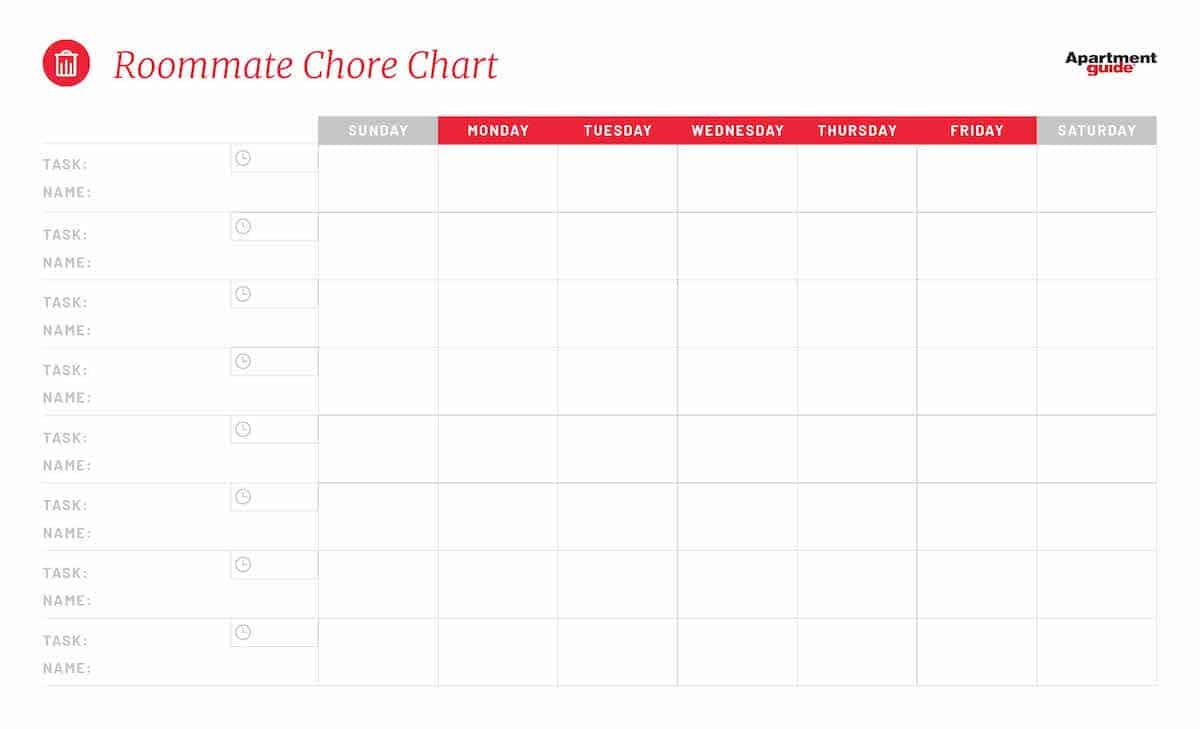How to Create a Roommate Cleaning Schedule: Tips from Experts
Dec 2, 2024
Jeremy Steckler from ApartmentGuide

Is there anything worse than coming home from a long day at work and seeing the kitchen turned upside down for the third day in a row? Before you throw in the towel, bring up a roommate cleaning schedule in your next house meeting. Whether you’re renting a house in Birmingham, an apartment in Boise, or even own a home in Seattle, WA, assigning specific tasks and building a roommate chore chart can help everyone take more responsibility for their messes.
Showing how you can work together vs. just sending passive-aggressive vibes can help you get along better and keep the apartment clean. It's all about communication when it comes to roommate compatibility.
Follow these tips to build a roommate chore chart and keep your home clean.
Sync on cleaning habits
Whether you found your roommate through Facebook, a friend, or an app, you only got a few minutes to get to know each other before you decided that they were a good fit. You must check compatibility during the interview.
Open up a discussion
When starting your roommate discussion, make sure to set some time aside to discuss expectations and goals. “Schedule a group meeting, prepare yourself to arrive calm and willing to compromise, and take a moment to acknowledge your shared goal — co-creating a comfortable living space,” says Megan Sullican-Tuba of Stella Nova Psychology, a mental health clinic in San Francisco, CA, and online.
Another recommendation comes from Silvia de Denaro Vieira of Coexist, an app for organizing home duties. “Plan a relaxed dinner to discuss everybody's cleaning expectations and priorities - order food and make it fun!”
Be upfront about expectations
When having discussions about cleaning, it can be tempting to downplay what you want, but that will only make things more difficult down the road. “Effective communication is based on letting others know exactly what you are looking for, and for them to tell you what they are looking for as well,” shares Tom McDonagh of Good Therapy SF, a therapy service in San Francisco, CA. “This only happens if you are upfront about your expectations. If you talk around the expectations vaguely, then you will definitely be disappointed in the future because others will not know exactly what you are asking for.”
Talk about your non-negotiables
Another thing to cover during your discussion is to chat about each roommate’s non-negotiables. Dr. Beth of Bright Light Counseling Center, a counseling center in Chicago, IL and Austin, TX, has some ideas on how to tackle this. “Before signing your lease, start a conversation about who will do what and when. Do you have to go to bed with a clean sink? Will you feel incredibly agitated and absolutely disgusted if the toilet is dirty?” says Dr. Beth. “Identify your non-negotiables and a sustainable schedule for each person to complete each chore. Each person should take responsibility for what is most important to them - and find equity in the division of tasks.”
Questions to ask
If you need a little guidance, here are a few questions that can help determine if you have the same cleaning habits, for example.
1. How often did you do the dishes in your old home?
2. How did you and your roommate split the deep cleaning of the apartment?
3. Did you have any altercations about cleaning tasks not being done? How did you resolve them?
4. If the trash is full, do you walk away or take it out and add a new bag?
5. How often do you think we should do a deep clean of the apartment?
You'll see red flags as they talk about their old roommates (this is why references are essential!) and determine if your cleaning personalities sync up.
If you need more, Silvia de Denaro Vieira of Coexist, an app for organizing home duties, has a few additional questions to ask that will help streamline the conversation.
“1. How often should we clean shared spaces?
2. Will each person own one area or will you rotate responsibilities?
3. How will we budget for and split any cleaning costs?”
As you’re answering the questions, follow up with some reflections about differences in expectations. “If there are differences in expectations, where can you make compromises or trade-offs?” says Silvia. “Should you hire professional cleaning services? How do you each prefer to communicate if any issues come up?”
Be willing to negotiate
Attitudes towards cleanliness can differ from person to person, so it’s important to be flexible. “If you and your roommates are clear in your expectations, there is a 100% guarantee there will be differences in preferences,” shares Tom McDonagh of Good Therapy SF. “Recognize that everyone has their own perspective and individual priorities. Be willing to respect others' priorities in addition to your own when negotiating for what you want.”
Get buy-in from everyone
Chatting about expectations and goals doesn’t just lay a good foundation for your roommate relationship, it also helps each roommate feel invested in the cleaning plan. "If you and your roommates decide to implement a cleaning schedule, it's important that it be mutually agreed upon, fair, specific, and flexible,” says Jonathan Ramos of bareWell, a therapy service in San Diego, CA.
“Having it be agreed upon by all roommates and having the duties being equally distributed creates a sense of buy-in from everyone involved, and prevents some parties from feeling unmotivated to follow through on the plans. Specificity prevents miscommunications and building resentment, and flexibility offers everyone a chance to give input and modify the cleaning schedule if all parties agree.”
How to make a cleaning schedule
What exactly does the word "clean" mean to you and your roommate? Determine how often the roommate should do the tasks — daily, weekly, monthly — and how detailed they should go with their task. For example, should someone clean the grout in the shower or wipe all surfaces in the bathroom? Does mopping come into the equation or just sweeping? It's essential to agree on what "clean" looks like for all roommates.
Assign zones to each person (kitchen, bathroom and living room) and what can be done together (outdoor space). This is a good time to make rules about personal items in shared spaces — don't leave your laptop or dirty socks in the living room, for example. Your personal things should remain in your bedroom.
Once you've made a list of the tasks to complete, it's time to create the roommate chore chart.

Making a roommate chore chart
While there's no allowance attached to this roommate chore chart like the good old days of childhood, the reward is a clean home and a good relationship with your roommate. We call that a win-win. Here's how to get started.
Bringing the situation up
No matter the relationship you have with your roommate, bringing up a chore chart can be stressful. “Bring it up to your roommates in a positive manner, such as, ‘I’m noticing that when our place is clean, I feel so much better. Would it be okay if we made a chore chart to keep it that way?’” recommends Dr. Andrea Zorbas, founder of Therapy Now SF, a collection of mental health providers in San Francisco, CA.
Make the chore list together
Pick a Saturday morning, make breakfast together, and spend a few hours walking around the apartment. “Bring some snacks to cut the possible tension that chores can bring. On a shared Google doc, write out all the different chores (cleaning bathrooms, kitchen, sweeping, mopping, etc). Taking out trash and doing your own dishes is a routine task to be shared,” says Dr. Andrea Zorbas.
As you’re walking through the apartment, make a list per room of the cleaning tasks you would like to see done. For example, in the kitchen, write down taking out the trash, loading the dishwasher, buying cleaning supplies, wiping down the counters, and sweeping the floor as items for your chore list. Then do the same for each shared space.
You can keep the bedrooms out of the chore list as they are personal spaces. List everything per room and evenly split tasks between the roommates based on interests and usage. These chore tasks typically are fast and easy to complete on a daily, weekly, and monthly basis.
Be as detailed as possible
Chores can have different meanings to different people. If you didn’t chat about everyone’s ideas of cleanliness before, make sure to review exactly what expectations will be. “‘Cleaning the bathroom’ or ‘taking out the trash’ will look different in execution to each person,” says Tom McDonagh of Good Therapy SF. “Create a list of how often these tasks should be completed with as much detail as possible. This will avoid any ambiguity in what each task looks like to each person.”
When are the tasks getting done?
Some tasks will happen every day like taking out the trash or doing the dishes and other tasks work well on a weekly basis. Next to each chore task, list how often the task is done. A few examples of timelines:
Daily: Empty out the garbage every morning, pick up clutter from shared spaces, and load the dishwasher. Pick up as you go is a great way to stay on top of dirty counter spaces, clutter, and dishes. Use a dish, put it in the dishwasher immediately after rinsing.
Weekly: Take the garbage to the curb, wipe all counters including kitchen and bathroom, sweep and vacuum the floors, clean the toilet and shower, and make any lists for the grocery store. Rooms like the living room and bathrooms should be cleaned on a weekly basis to avoid any pile-up of dirt, food, or clutter.
Monthly: Wash all kitchen towels and couch blankets, replenish any household items that are old, and clean out the fridge. The kitchen should be deep cleaned on a monthly basis and it's best for a team project.
Shell out the assignments
Split chore assignments evenly, so everyone is doing the same or similar amount of work and add their name next to the assignment with a deadline, if applicable. “Try dividing tasks based on personal preferences and strengths. For instance, if one roommate doesn’t mind vacuuming but hates dishes, use that to everyone’s advantage,” says James Edge of Beyond The States, a blog for college students seeking international education.
Tara Caitlin, a lifestyle med blogger, seconds this idea. “Try assigning tasks based on what each person doesn’t mind (or secretly loves) doing. If your roommate’s a vacuuming virtuoso and you’re all about a spotless kitchen, embrace it!” says Tara. “For the not-so-fun jobs, create a weekly rotation to keep things fair. Make it official with a shared Google Calendar or a big list on the fridge, and have a weekly 5-minute ‘clean chat’ over coffee or a drink to keep things light and drama-free!”
Other tasks like loading the dishwasher need to be completed by the person who didn't cook dinner or, if you don't cook dinner together, by the person who made the mess. This way, some of the tasks rotate, especially those that are generally not wanted. Roommates assigned weekly completion tasks can pick a specific weekday, so they don't all pile up on the weekends.
Before finalizing the assignments, make sure everyone agrees and airs out their grievances to ensure all compromises were met.
Print out the roommate chore chart
Here's a quick template to use for your roommate chore chart — download the chore chart so you can print it, laminate it and stick it on the fridge for everyone to see your roommate cleaning schedule.
Try an app instead
If you’re struggling with a chore chart having enough incentive, try one of the many chore apps available. “If you want to forego a traditional chore chart, chore apps like Tody help you share your household tasks, stay on top of your schedule through reminders, and incentivize cleaning through earning points and tracking roommate progress,” says Megan Sullican-Tuba of Stella Nova Psychology, a mental health clinic in San Francisco, CA, and online.
There are plenty of other apps to try, so feel free to give a few a try. “To set reminders or alternate task owners, you can also use an app like Coexist,” says Silvia de Denaro Vieira of Coexist, an app for organizing home duties.

Check-in as time goes on
Once you've settled with the roommate cleaning schedule for a few weeks, review it again during your next roommate meeting. If it's better for you to do the dishes at night, and maybe your roommate can take the trash out in the morning, make sure to communicate that. You have a higher probability of sticking with it if it fits your schedule a little more.
Schedule house meetings to track progress
Dr. Beth of Bright Light Counseling Center, advises against relying on group chats and instead opting for house meetings. “Group chats can lead to passive-aggressive communication, so schedule a face-to-face house meeting to discuss cleaning responsibilities instead,” says Dr. Beth. “During this meeting, have each roommate share what's working and what needs improvement, then collaboratively brainstorm and evaluate solutions until you find workable arrangements that everyone agrees on. Check in at follow-up meetings to assess if your chosen solutions are creating a more equitable and cleaner household.”
Rotate the chore chart
Monotony can really start to wear on you – especially if you’re stuck doing the tasks no one wants to do. “One of the most important things: rotate tasks. This way one person isn’t stuck cleaning the toilet each week. Since you are rotating, be clear about the timing of when chores need to be completed; Sunday is a common day since it’s often a day off and the last day before the start of the week,” shares Dr. Andrea Zorbas.
Gentle reminders
To avoid awkward reminders, try setting up a digital service to send automated follow-ups. “Use a shared digital calendar or app like Google Calendar or Trello to set gentle reminders and track completion — it keeps everyone accountable without awkward follow-ups,” says James Edge of Beyond The States.
Continue to practice clear communication
Clear communication among roommates is key to maintaining a positive living environment. “By openly discussing expectations, schedules, and boundaries, everyone can avoid misunderstandings and reduce conflict,” says Niquie Dworkin of Lakeview Therapy, a collaborative group of independent therapists in Chicago, IL.
“It's important to regularly check in with each other about shared responsibilities like cleaning, noise levels, and guests, and to address any issues promptly and respectfully. When roommates communicate clearly and honestly, they create a space where everyone feels heard and respected, fostering a more enjoyable and cooperative living arrangement.”
Changes to the schedule
Should someone move out or someone move in, that’s a good time to reevaluate the chore chart. “Have a new meeting whenever a new roommate moves in or out so that tasks can be reassigned and expectations are clear,” advises Dr. Hannah Yang of Balanced Awakening, a psychotherapy service in Chicago and Miami specializing in therapy for couples and women.
Keep the (cleaning) harmony at home with a roommate cleaning schedule
Finding the perfect roommate is genuinely a feat. It's so hard to get to know a perfect stranger over a short meet-up. But if you communicate your expectations initially, like what cleaning mistakes set you off, you'll find a better fit for your home.
Refer back to this roommate chore chart when discussing your cleaning schedule and check in with each other as time passes for any needed changes.